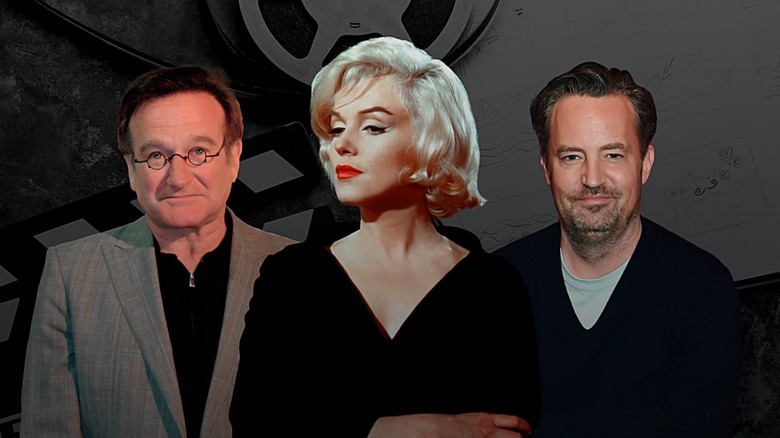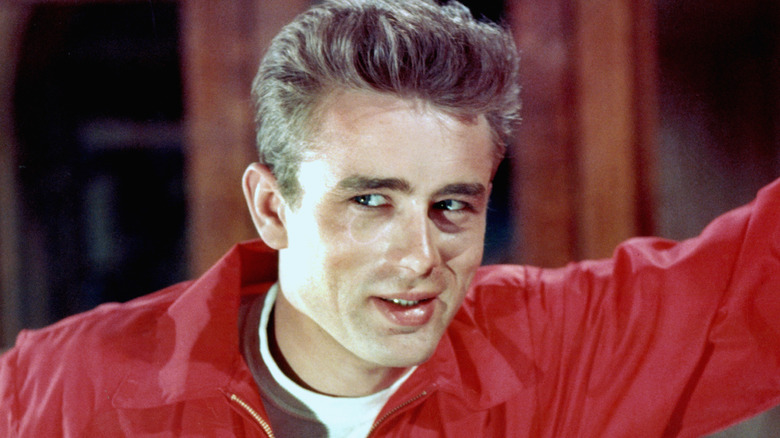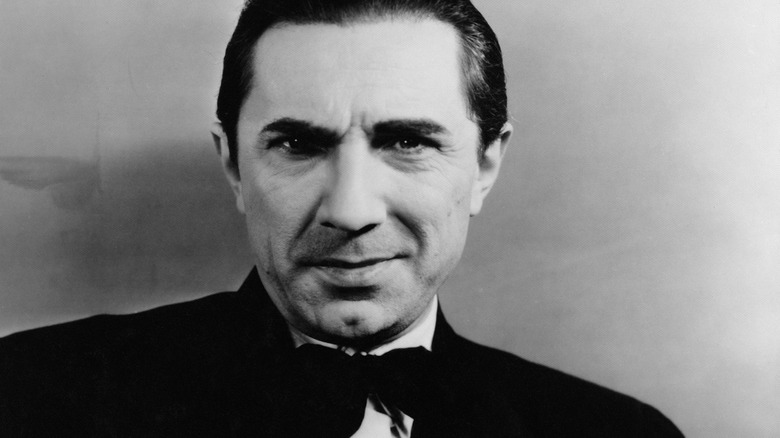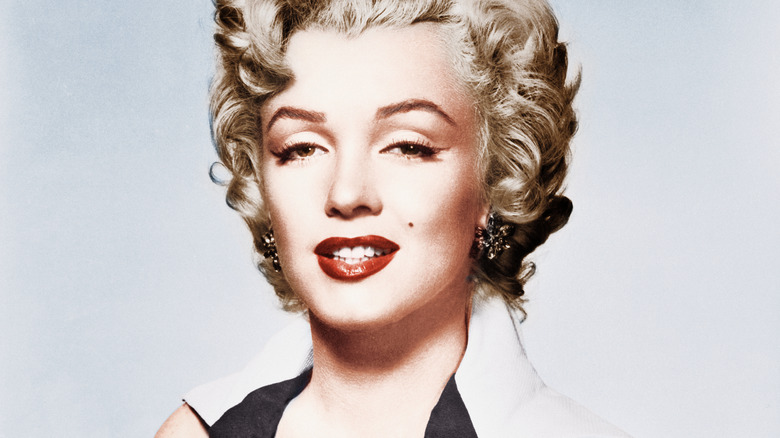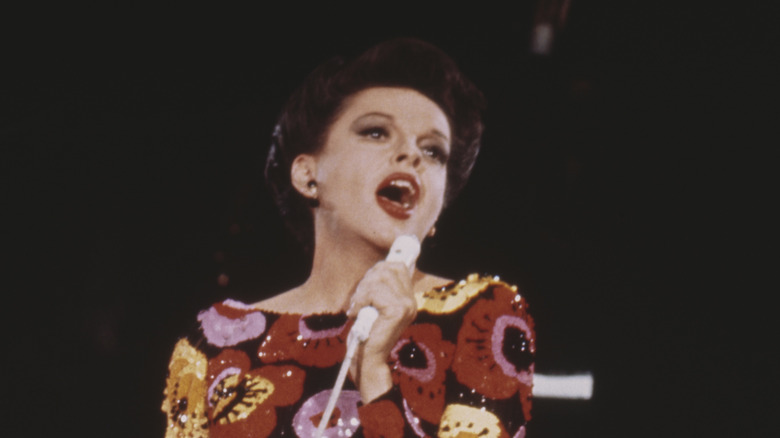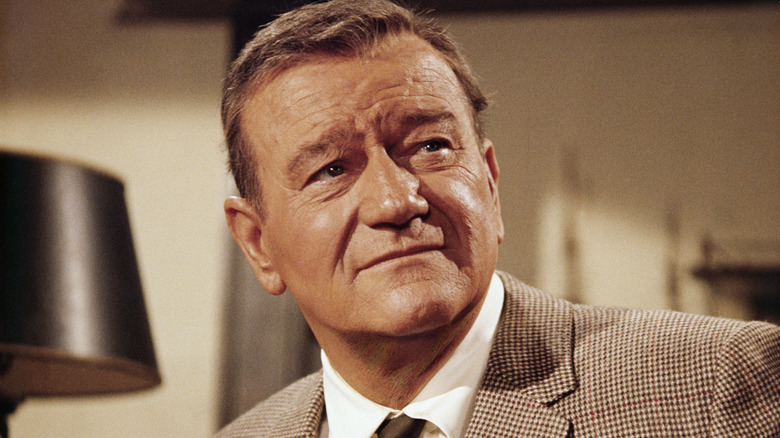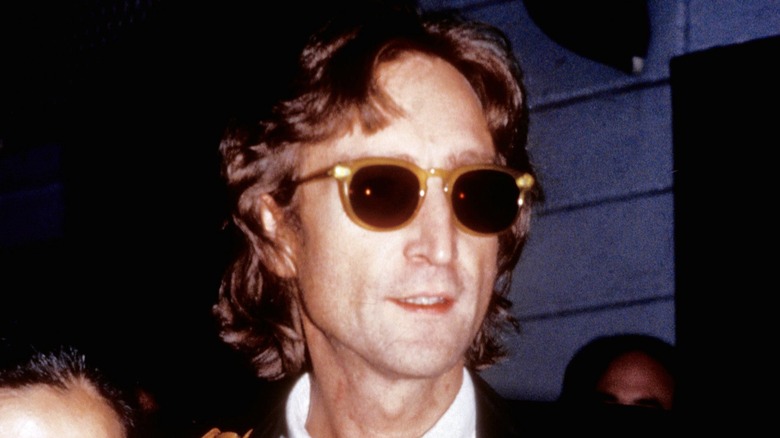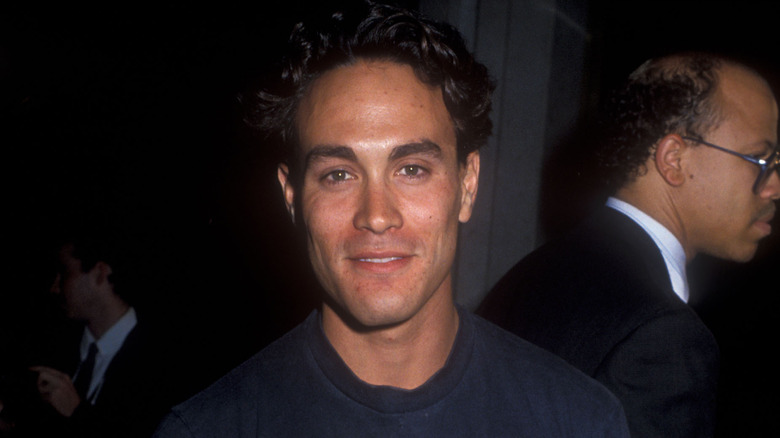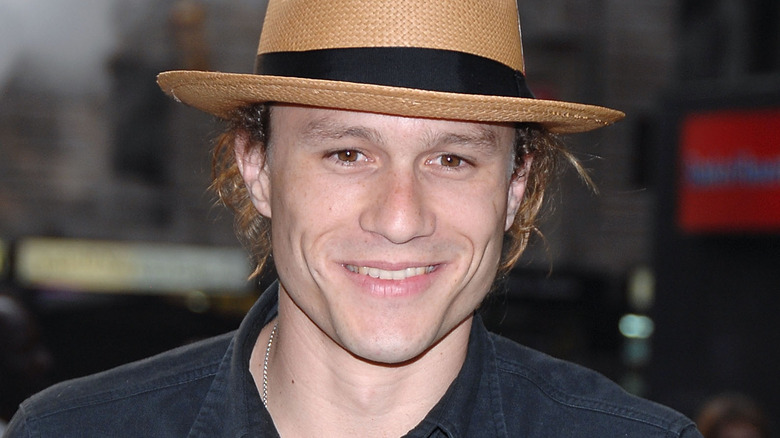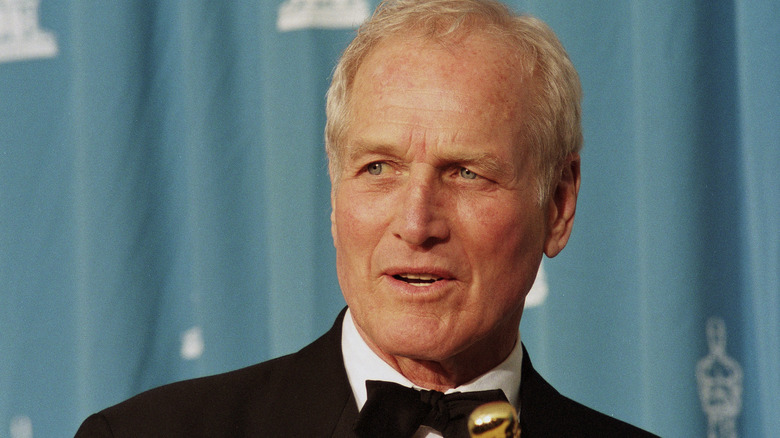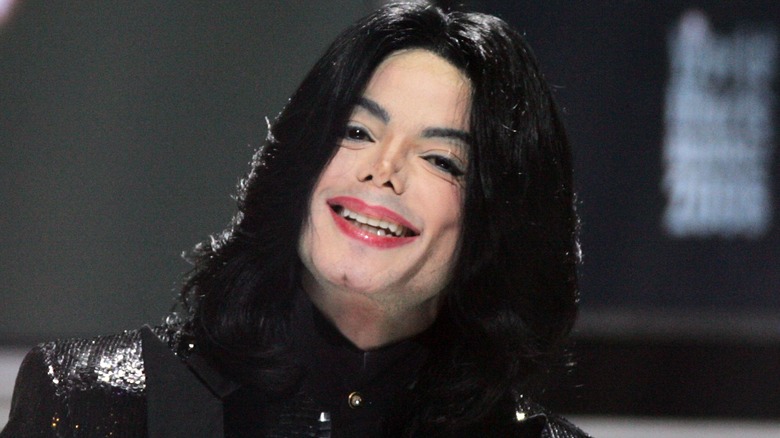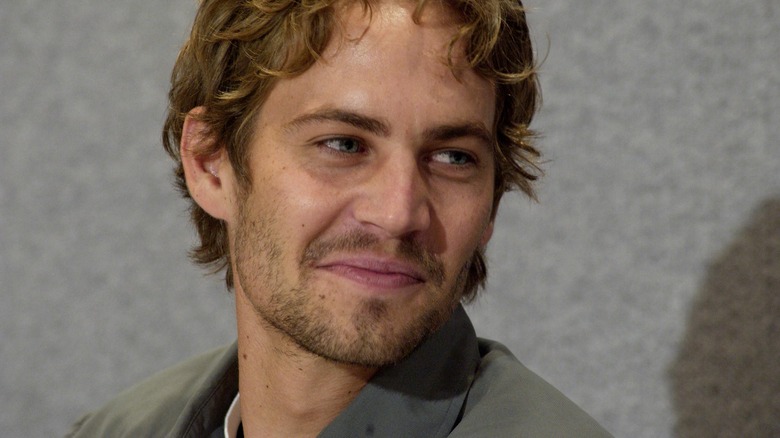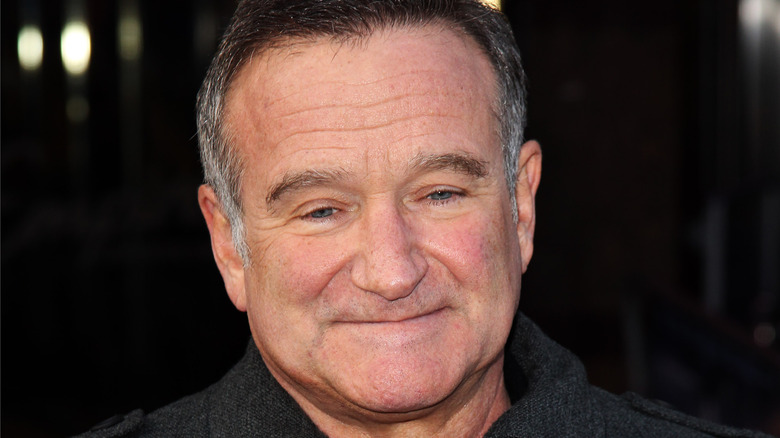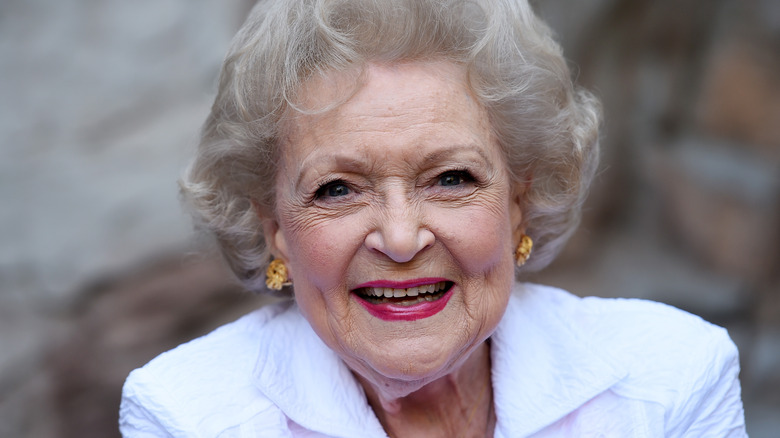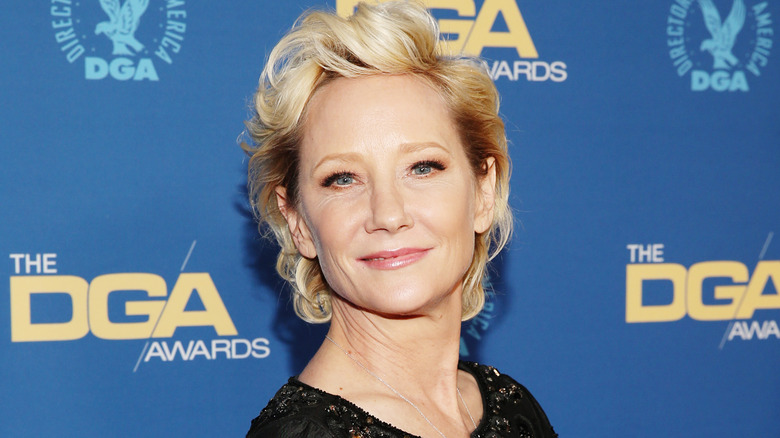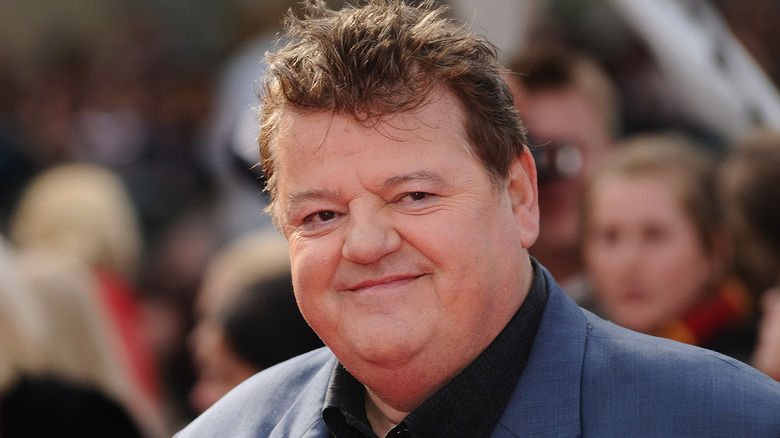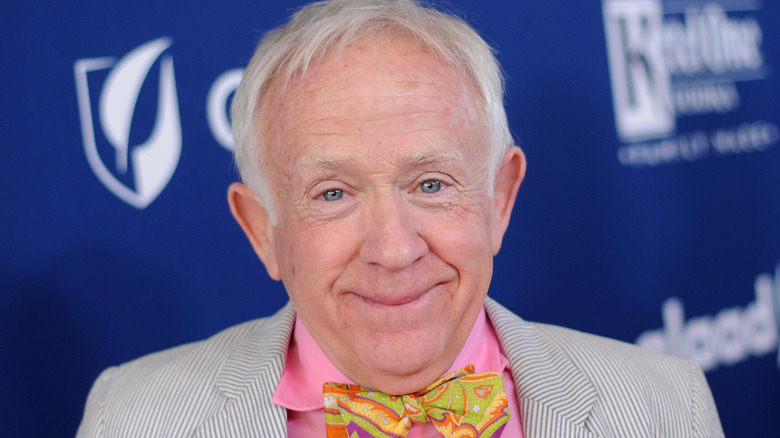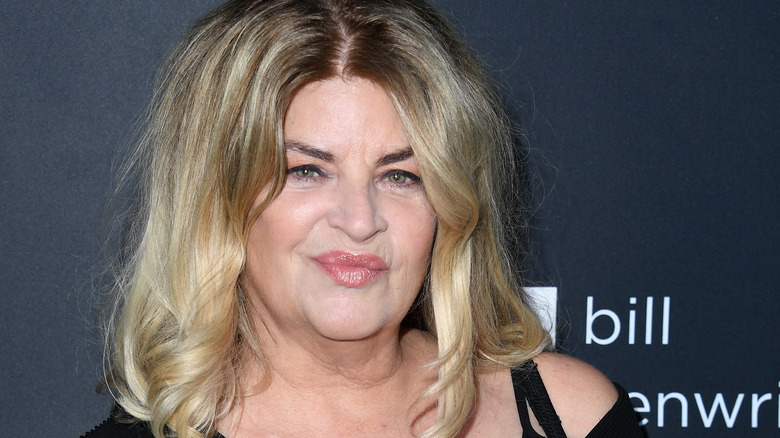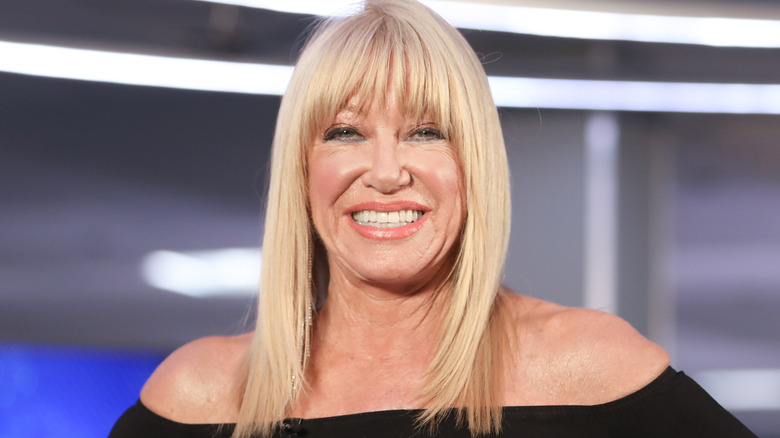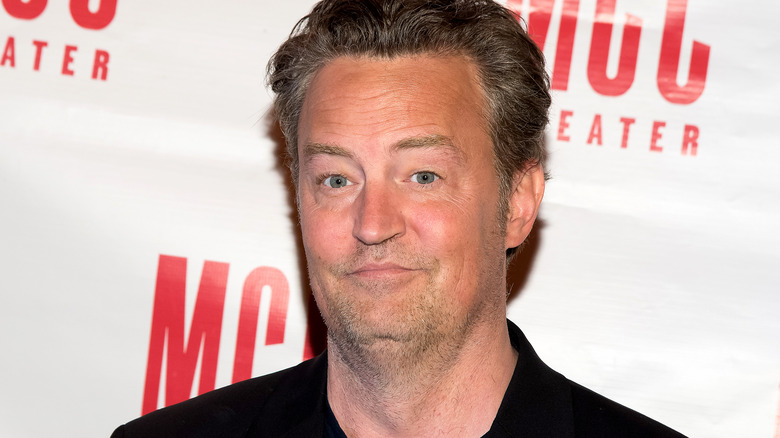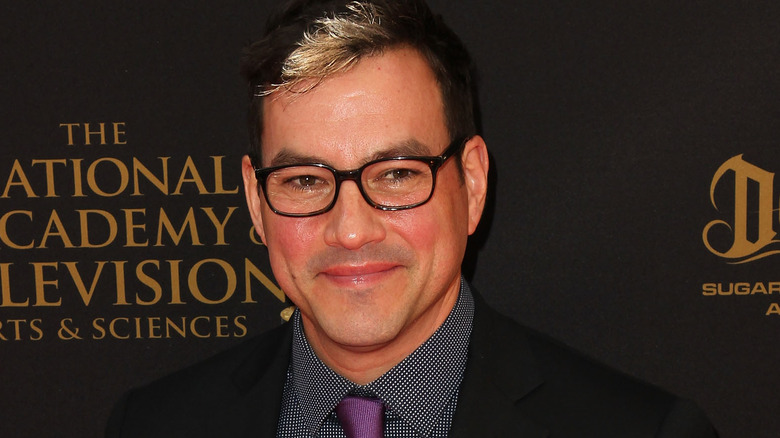The Last Interview These Actors Did Before They Died
The following article includes descriptions of substance abuse, mental health, and suicide.
Part of an actor's job is to go out and do interviews with the media. This helps them spread the word about their ongoing or upcoming projects, and it also shows the world who they are as people. Often, an actor's performance defines who they are to the public, so seeing them relax and share personal stories about their lives, their loved ones, and even their struggles helps to humanize them — they are people, after all.
When an actor dies, it's not always due to an illness or something expected. Many die tragically, shocking their fans who hope to gain insight into what their favorite actors were doing before they died. One of the best ways to do this is to go back and watch or read an actor's final interview. Sometimes, these occur shortly before someone dies, but they can also be routine promotional interviews designed to shed light on their latest project.
Whatever the topic, an actor's final interview often offers some closure for the fans. These actors all had interviews relatively close to their deaths, and each offers a unique view into some of the most prominent actors we collectively celebrate.
James Dean talked about speed shortly before his deadly accident
James Dean's career was short, but at its height, he was one of the most celebrated actors of his generation. He's since become a cultural icon, so much so that people who've never watched his films know who he is. Dean's two most prominent films, "Rebel Without a Cause" and "East of Eden," led to his final project, "Giant." Dean received two posthumous Academy Award nominations for his work, and while promoting "Giant" and filming an episode of "Warner Bros. Presents," he gave his final interview.
Fellow actor Gig Young, of "They Shoot Horses, Don't They?" fame, interviewed Dean 13 days before his death. Because of Dean's sudden, unexpected demise, the segment didn't air and sat unreleased for years. It was later added as an extra feature on the "Rebel Without a Cause" DVD and shows Dean wearing a costume for his "Giant" character, Jett Rink. In the interview, Young asks Dean about racing and driving competitively.
Young asks him about fast driving on the highway, asking if it's a good idea. Dean says, "I started racing, and now I drive on the highways extra cautious." He talks about not having the urge to race on the highway, ending with, "Take it easy driving; the life you save might be mine." Dean died less than two weeks later in an accident involving his Porsche 550 Spyder and another car while en route to a race in Salinas, California.
Bela Lugosi spoke about his recovery and rehabilitation
Bela Lugosi was the preeminent horror film actor of his generation, responsible for bringing Count Dracula and many other important characters to life on the silver screen. He's probably best known for playing the iconic vampire in 1931's "Dracula," and his career continued with many other notable movies. His final film was the legendarily awful "Plan 9 from Outer Space," but he's remembered and celebrated for so much more.
Sadly, his career declined into the 1950s, and he became addicted to alcohol and morphine. This led Lugosi to enter rehab, hoping to come out of it with a new lease on life and a way out of financial destitution. During his treatment, Lugosi received support from his fellow entertainers around the globe, helping him along the way, and shortly before leaving the hospital, he stopped for his final interview.
Lugosi didn't hold back in talking about his time in rehab and how he found his way there. During the interview, Lugosi explained that he was 45 pounds underweight and remained in the hospital for 90 days. He also said he looked forward to working again and discussed his next job with Ed Wood. Lugosi was optimistic about the next phase in his life, but within a year, he died of a heart attack, passing peacefully in his sleep at the age of 73.
Marilyn Monroe shared her feelings about fame
Marilyn Monroe is one of the original blonde bombshells, but she was so much more than just that. As the most popular sex symbol of the 1950s, Monroe stood out for her performances in some of the era's greatest films, including "Gentlemen Prefer Blondes," "The Seven Year Itch," and "Some Like It Hot." Throughout her life in the spotlight, Monroe endured widespread worldwide fame rarely seen outside of royalty, which took a toll.
Monroe's exposure led to substance abuse and mental health issues. Monroe gave her final interview to Richard Merryman of Life Magazine. The piece appeared in the August 3, 1962 issue, only two days before Monroe's death. In the interview, Monroe talks about the pressures of living life in front of the cameras. "When you're famous, you kind of run into human nature in a raw kind of way. It stirs up envy; fame does ... I don't look at myself as a commodity, but I'm sure a lot of people have."
Monroe's distaste for fame comes across clearly in the interview, and she sums it up best, saying, "Everybody is always tugging at you." Two days after the article hit the streets, Monroe's psychiatrist found her lying face down on the bed, dead at the age of 36. Her death was ruled a probable suicide from an overdose of Nembutal and chloral hydrate.
Judy Garland reminisced about her career
Judy Garland found fame early in life through a series of comedies, but she's probably best known today for playing Dorothy Gale in "The Wizard of Oz." Still, she had a long and impressive career, which lasted for more than 40 years. As she grew older, she took on more mature roles, but her personal issues complicated her professional life. Garland dealt with mental illness and addiction, which nearly destroyed her career.
Her ex-husband, Sid Luft, alleged Garland attempted suicide at least 20 times, and she had various mental health issues. Garland's mental health impacted her physical health, and she had several issues that made it difficult for her to work. Despite her psychological and physical difficulties, Garland worked hard, earning acclaim for "A Star Is Born," and hosting "The Judy Garland Show." On March 26, 1969, Garland gave what would be her final interview with Radio Denmark.
In the interview, Garland looked back at her time in the spotlight, stating, "My life and my career have been like a roller coaster. I'm either an enormous success or just a down-and-out failure." Garland also spoke about her love of performing in front of audiences and said she didn't live a rich life, offering instead, "It's been an interesting life." Three months after the interview, Garland's husband, Mickey Deans, found her sitting on the toilet holding her head, dead of an accidental drug overdose at the age of 47.
John Wayne talked about his mortality and career
Even if they've never seen one of his many film performances, John Wayne is one of those actors people know. Wayne was a cultural icon known as "The Duke," and he appeared in nearly 150 movies throughout his six-decade career. Wayne's most prominent work was in Westerns like "True Grit" and "The Searchers," but he also branched out into other genres. Still, most know Wayne as a walking, talking representation of America's frontier spirit.
Barbara Walters interviewed John Wayne in his final talk with the media in 1979. Walters asked about facing death due to his poor health and if he had a philosophy on life. Wayne replied, "Listen, I spoke to the man up there on many occasions, and I've always had deep faith that there's a supreme being ... The fact that he's let me stick around a little longer — [motioning toward his wife] or she's let me stick around, certainly goes great with me. And I want to hang around as long as I'm healthy and not in anybody's way."
The day after Walters' interview with Wayne, he went into the hospital and never recovered. Wayne's bout with cancer began 15 years before his death. He first underwent surgery for lung cancer, and in 1979, a gallbladder removal operation found stomach cancer, which ultimately caused his death. Wayne died on June 11, 1979, at the age of 72.
John Lennon's final interview was published 30 years after his death
John Lennon was one of the founding members of The Beatles, one of the greatest and most successful bands in music history. Lennon co-wrote many of The Beatles' songs and continued performing after the band broke up in 1969. Lennon's solo career centered around his activism and liberal-leaning philosophy, resulting in one of his most celebrated songs, "Imagine." Lennon and his wife, Yoko Ono, lived in Manhattan, which is where he died.
On December 8, 1980, Mark David Chapman asked Lennon to sign an album outside his apartment building. The singer obliged, and several hours later, Chapman shot and killed Lennon in the same spot. Three days before his death, Lennon sat with Jonathan Cott of Rolling Stone for over nine hours in what was his final print interview. The piece was the cover story for the first issue of 1981, but Cott shelved it, opting to write an obituary instead.
Lennon's final interview came only hours before his death. Lennon finished a photo shoot with Annie Leibovitz for the Rolling Stone piece before meeting Dave Sholin and Laurie Kaye. Lennon spoke about his son, Sean, and how he met and fell in love with his wife. They also discussed his daily activities and general information about his life. Lennon's final interview came out a week after his death, while Cott's interview went live 30 years after Lennon passed.
Brandon Lee promoted what would be his final film
The son of Bruce Lee, Brandon Lee followed in his father's footsteps to become a martial artist and actor. Lee spent most of his acting career playing minor and leading roles in martial arts films produced in Hong Kong and the United States. He appeared in "Kung Fu: The Movie" and "Showdown in Little Tokyo" opposite Dolph Lundgren. Lee paid his dues and landed the lead in 1994's "The Crow," which would be both his breakout and final film role.
During the film's production, Lee promoted "The Crow" by speaking to the media. His final interview came during one of these promotional discussions, which is included in "The Making of 'The Crow.'" In the interview, a smiling Lee speaks enthusiastically about the movie and being cast to play Eric Draven. He talks about the crow in the movie and how it guides his character back from the dead to remind him of what the bad guys took from him.
Lee detailed how he understood his character and the crow's importance in doing so. It's obviously a promotional interview, but it's apparent how much Lee enjoyed playing the character. On March 31, 1993, while filming a scene involving a .44 Magnum revolver, an improperly made dummy round resulted in a blank round dislodging a dummy bullet from the barrel, which shot right into Lee's abdomen. He died shortly after at the age of 28.
Heath Ledger divulged his dependence on medication for sleep
Heath Ledger found fame by playing Patrick Verona in "10 Things I Hate About You," but it wasn't the Australian actor's first role. Ledger began acting when he was 13, and throughout his career, he tackled some impressive characters. He gained additional fame via "A Knight's Tale," "Monster's Ball," and "Brokeback Mountain," but these days, he's probably best remembered for playing the Joker in "The Dark Knight." The role earned him a posthumous Academy Award and exhibited his immense talent.
While the Joker is one of Ledger's most celebrated roles, he told The New York Times that playing the character was mentally and physically taxing. After all, it's not easy to relate to a "psychopathic, mass-murdering, schizophrenic clown with zero empathy." Ledger also spoke about his insomnia, explaining that he slept about two hours a night. Chuck the Movie Guy interviewed Ledger a few weeks before his passing in his final interview.
Ledger discussed his part in "I'm Not There," in which he played one of six versions of Bob Dylan. Restful sleep eluded Ledger for years, resulting in depression and drug addiction to combat his insomnia. On January 22, 2008, Ledger's housekeeper found him unconscious in bed. Attempts to revive him failed, and he died at the age of 28 from "acute intoxication by the combined effects of oxycodone, hydrocodone, diazepam, temazepam, alprazolam, and doxylamine," as CNN reported.
Paul Newman spoke about his wife
Paul Newman's interest in acting went back to his childhood, and he followed that dream into the theater. Before long, he starred in some of the best films of his generation, including "Cool Hand Luke," "Butch Cassidy and the Sundance Kid," and "The Sting." Newman won the Academy Award for best actor in 1987 for "The Color of Money," which was only one of his nine nominations. He also won an honorary Academy Award, recognizing his lifetime of work in film.
Newman's life revolved around acting, but he was also a WWII veteran, a racing enthusiast, and a philanthropist. If you've ever bought some of his Newman's Own salad dressing, you've taken part in the actor's philanthropy, as the organization's charitable contributions benefit children, with over $350 million in donations. Newman continued working in film and television until the end, though his failing health limited most of his work to voiceover roles.
TV host Renée Loux conducted Newman's final interview for Fine Living Network. Newman's health problems are apparent in the interview as they shop in a farmers' market. For most of their talk, Newman focused on his wife, Joanne Woodward, as the two held hands beneath the table. Newman described her, "I've always said Joanne was the best-looking tomato in the kitchen." Newman died soon after, on September 26, 2008, from lung cancer — he was 83.
Michael Jackson talked up Will.i.am and their collaboration
Michael Jackson was known as the King of Pop, having started his career alongside his brothers in the Jackson 5. Jackson launched his solo career in 1971 and gained widespread fame from his second album, which contained "Thriller," "Billie Jean," and "Beat It." Jackson wasn't just a cultural icon — he was a fashion, music, and dance icon celebrated around the world. That said, he lived a controversial life, one that was cut short as he attempted to launch a comeback.
Toward the end of his life, Jackson fought off allegations of child sexual abuse stemming from many adults who stayed with Jackson at his home, Neverland Ranch, when they were children. Jackson wasn't found guilty of these allegations, but his image suffered nonetheless. In his final interview with Access Hollywood, Jackson talks up his collaborator, Will.i.am, during an exploratory music session. Jackson is relaxed and in good spirits during the interview inside a recording studio in Dublin, Ireland.
When asked why he teamed up with Will.i.am, Jackson said, "Because I think he's doing wonderful, innovative, positive, great music. I thought it would be interesting to collaborate or just, you know, see how the chemistry works." Not long after the interview, Jackson died from cardiac arrest. His death resulted from an overdose of propofol, resulting in the conviction of his physician, Conrad Murray, of involuntary manslaughter.
Paul Walker discussed his latest project and the one that made him famous
Paul Walker's career began in childhood with appearances in films and television shows. He starred in several episodes of "Throb," "Highway to Heaven," and "The Young and the Restless." This helped build Walker's career, but it's not what he's remembered for today. While he starred in a plethora of projects throughout his life, fans remember Walker for playing Brian O'Conner in the "The Fast and the Furious" franchise. Before he died, Walker worked on "Hours" and "Furious 7."
While he gave several interviews before his death, one of his last with Miriam Isa of Clevver endures as evocative of Walker's genuine and relatable persona. Walker didn't wear shoes for the interview and spoke about his luck in working with various talented Hispanic actors. He talked about the girls he dated growing up and maintained a fun rapport with Isa throughout their discussion, which ultimately turned to his work on "The Fast and the Furious."
Walker easily slips into discussing the franchise while working on "Furious 7," which would be his final film role. On November 30, 2013, Walker left an event with Roger Rodas, who drove at high speed into a light pole, causing the car to burst into flames. Both men died almost instantly, though both bodies were burned beyond recognition. Walker's brother, Cody, helped portray him in a final scene in "Furious 7."
Robin Williams explained how he prepared to play Eisenhower
Robin Williams was one of his generation's most talented comedic actors, and he was a master of improvisation. Williams' energy permeated every one of his performances, and just when you thought you knew him as a comic, he flipped the script and proved his dramatic chops in films like "Good Will Hunting," "One Hour Photo," and Dead Poet's Society." Williams was the kind of entertainer who embodied the concept of breaking the mold and was celebrated for his work.
Williams spoke with the press often, but his final interview in 2013 came months before his passing. He talked about playing Dwight D. Eisenhower in "The Butler" for The Weinstein Company as part of the film's behind-the-scenes featurette. Williams calls Eisenhower a fascinating man who dealt with ego. He describes him as having a high-pitched voice that resonates, and that playing Eisenhower was challenging but a role he genuinely appreciated.
Williams spent much of his life dealing with addictions to cocaine and alcohol, but he found sobriety after his friend, John Belushi, died. He turned his life around where drugs were concerned, but went in and out of rehab for alcoholism several times, and it took a toll. Williams died by suicide at the age of 63 on August 11, 2014: An autopsy found evidence of diffuse Lewy body dementia, which contributed to his depression and suicide.
Betty White spoke about her health and happy life
Betty White was one of those actors multiple generations grew up watching. Whether you first met her in "The Golden Girls," "The Proposal," or "The Mary Tyler Moore Show," she popped up somewhere for just about everyone. White began working before WWII, which brought her into the American Women's Voluntary Service. After the war, she worked in radio, television, and film, where her impeccable comic timing and positive energy made her stand out.
White continued working for decades and holds the Guinness World Record for the longest TV career for a female entertainer. People conducted White's final interview for the cover article, focusing on how she felt about turning 100. White said, "I'm so lucky to be in such good health and feel so good at this age. It's amazing." White also talked about her famously upbeat nature, calling herself a "cockeyed optimist," a quality she got from her mother.
As she often did in interviews, White cracked jokes and maintained a positive vibe throughout. Sadly, White died soon after the interview's publication, just weeks before she would have turned 100 years old. White had a stroke on Christmas Day 2021, and died on December 31 in her sleep. Despite being 99, White's death shocked the world, and her agent, Jeff Witjas, summarized this perfectly, telling People, "Even though Betty was about to be 100, I thought she would live forever."
Anne Heche talked about Dancing with the Stars
Anne Heche began working in television, playing twins in "Another World," and eventually branched out into feature films. Throughout her career, Heche appeared in several high-profile movies, including "Donnie Brasco," "I Know What You Did Last Summer," and "Psycho." As her career progressed, Heche got into directing and returned to the theater and television, but despite her impressive career in multiple entertainment mediums, Heche's name often dominated headlines for personal reasons.
Heche's highly-publicized relationship and breakup with Ellen DeGeneres made her a tabloid target for years. After the couple broke up, Heche had a mental health crisis, which she detailed in her memoir, "Call Me Crazy." Heche became a contestant on the 29th season of "Dancing with the Stars," which she discussed in her final podcast interview on "Behind the Velvet Rope with David Yontef." Heche gave the interview in January, and it was published in August 2022.
In the interview, Heche talked about her time on "Dancing with the Stars," saying, "We were given an opportunity in this moment to reintroduce me to an audience that I had not been reaching and never had the opportunity to reach. It was fun on very many levels" (via Heavy). On August 5, 2022, Heche crashed her car at high speed into a home in Los Angeles. She was severely injured and comatose following the accident. Heche died on August 11 at the age of 53.
Robbie Coltrane reflected on his legacy as Hagrid
Robbie Coltrane worked through five decades, mainly in television and film. Throughout his career, Coltrane performed alongside some of the most talented people in the industry, and proved his worth next to the likes of Emma Thompson, Pierce Brosnan, and many others. He appeared in "GoldenEye," "Ocean's Twelve," and dozens of other movies, but he's best known for playing Rubeus Hagrid in all eight "Harry Potter" films. Coltrane's final interview came in celebration of the 20th anniversary of the "Harry Potter" franchise, as part of an HBO special.
Coltrane reflected on his work in the films, which amounted to a decade of his life. He acknowledged that his children grew up during that period and said, "The legacy of the movies is that my children's generation will show them to their children. So you could be watching it in 50 years' time, easily. I'll not be here, sadly ... But Hagrid will. Yes." Coltrane thought back on playing Hagrid, saying, "It's the end of an era. It's ten years of my life" (via Independent).
Coltrane's health declined due to constant pain from osteoarthritis, requiring the use of a wheelchair, beginning in 2019. His health remained poor for two years leading up to his death on October 14, 2002, at the age of 72. According to Deadline, Coltrane's cause of death was the result of multiple organ failure, sepsis, a lower respiratory tract infection, and a heart block.
Leslie Jordan talked about his new career path
Leslie Jordan's unique comedic style first entertained fans on television and in films in the mid-1980s, and he built a career that lasted decades. While he worked on many shows and movies, Jordan found newfound fame during the COVID-19 pandemic. Without another outlet for his comedic creativity, Jordan turned to social media and amassed a vast following that revitalized his career. This led to the publication of his autobiography, "How Y'all Doing? Misadventures and Mischief from a Life Well Lived" in 2021.
Jordan spoke with CBS Mornings in his final interview, which focused on his life and recent career change. Jordan added singing to his list of accomplishments with the release of his album, "Company's Comin'" in 2021. He told CBS it was "So unexpected just to happen in my sixties — I'm a country music singer now." He also discussed his Instagram fame and his time in quarantine, posting twice each day. He said he "was a marketing genius and didn't even know it," explaining how he avoided religion and politics.
On October 24, 2022, Jordan drove his car into the side of a building, likely due to a medical emergency. He died as a result of the crash from a "sudden cardiac dysfunction," resulting from arteriosclerotic cardiovascular disease; he was 67.
Kirstie Alley discussed her Star Trek role and career
Kirstie Alley began acting in television, but her first film role as Saavik in "Star Trek II: The Wrath of Khan" made her a household name. After that film, Alley played numerous characters in TV series before settling into Rebecca Howe on "Cheers," where she remained until the series ended in 1993. She starred in the "Look Who's Talking" trilogy and spent some time in reality television towards the end of her career, with her final performance coming in the seventh season of "The Masked Singer."
In one of her final interviews, Alley talked about playing Saavik, a role that went to Robin Curtis in two sequels. Alley explained that she didn't know why she didn't return to play the character, though she received an offer that didn't meet her expectations. Essentially, the studio didn't offer enough money for the role, so it went to Curtis, though Alley claims she would have liked to reprise the role.
In May 2022, Alley received a diagnosis of colon cancer and began chemotherapy treatments soon after in Tampa, Florida. Alley died on December 5, 2022, at the age of 71. Her family broke the news of her death on Instagram, writing that, "she was surrounded by her closest family and fought with great strength."
Suzanne Somers looked forward to her 77th birthday
Suzanne Somers' career spanned seven decades, and while she worked in many mediums, she's probably best known for playing Chrissy Snow on "Three's Company." Of course, Somers did more than act in a sitcom in the '70s; she was also an author with more than 25 books to her name, and she was the spokeswoman for the ThighMaster exercise machine that dominated television advertisements through the 1990s. Additionally, Somers was known for holding controversial views about health and medicine.
Somers worked in theater and spent time on the Home Shopping Network, so she had an incredibly varied career. Somers gave her final interview to People, which she did only a week before her death. At the time, Somers' health was in decline, so she conducted the interview via email, telling People she planned to be with her family on her 77th birthday and was looking forward to her birthday cake. She also discussed her recent diagnosis of breast cancer, saying, "As you know, I had breast cancer two decades ago, and every now and then, it pops up again, and I continue to bat it down. I have used the best alternative and conventional treatments to combat it. This is not new territory for me. I know how to put on my battle gear, and I'm a fighter." Somers died one day before her birthday, on October 15, 2023.
Matthew Perry talked about his legacy and sobriety
Matthew Perry spent the first decade of his career as a working actor, but he didn't gain fame until 1994. Perry landed the role of Chandler Bing on "Friends," and the series established Perry as an immediate presence in Hollywood. He went on to star in feature films and appear in other series, though "Friends" is his most memorable and significant project.
Throughout his career, Perry went in and out of rehab for alcohol and substance abuse. Perry's substance abuse became public knowledge, and it became a significant part of his life. In 2022, Perry told The New York Times that he spent "$9 million or something trying to get sober." Perry eventually found his way to sobriety, and he spoke about it often in interviews. In one of his last interviews, given a year before his death to promote his memoir, he spoke on "Q with Tom Power," discussing how he wanted to be remembered.
"The best thing about me, bar none, is if somebody comes up to me and says, 'I can't stop drinking. Can you help me?' I can say, 'Yes,' and follow up and do it. When I die, I don't want 'Friends' to be the first thing that's mentioned. I want that to be the first thing that's mentioned." Perry died on October 28, 2023, in his home at the age of 54.
Tyler Christopher discussed his approach to his work
Tyler Christopher's breakout role was also his first — he joined the "General Hospital" cast in 1996, playing Nikolas Cassadine. Christopher was in this role intermittently for several years before transitioning to playing Connor Bishop. While he remained a part of "General Hospital" for 20 years, Christopher also worked in other series, including "Charmed," "Angel," "Felicity," and "Days of Our Lives," which he joined in 2017 as Stefan DiMera.
Despite his many TV credits, Christopher was a soap actor through and through. He gave his final interview with Digital Journal during a fan event hosted by CaliBx Experience in New York City. The interview covered a broad range of topics, including Christopher's Emmy Award for his work on "General Hospital," explaining that filming the Emmy reel scenes was difficult, but "I didn't hold back, and that paid off in the end."
The conversation continued with coverage of AI and its impact on the business. When asked about his favorite motto, Christopher said, "Don't Hold Back. That's how I approach my work ... I trust my instincts, I don't hold back, and that gets me through it. This allows me to take chances in my scenes." On October 31, 2023, Christopher died in his San Diego, California, apartment at the age of 50 from a cardiac event.
If you or anyone you know needs help with addiction or mental health issues, contact the relevant resources below:
-
The Substance Abuse and Mental Health Services Administration website or SAMHSA's National Helpline at 1-800-662-HELP (4357).
-
The Crisis Text Line by texting HOME to 741741 or the National Alliance on Mental Illness helpline at 1-800-950-NAMI (6264), or visit the National Institute of Mental Health website.
-
If you or someone you know is struggling or in crisis, help is available. Call or text 988 or chat 988lifeline.org
